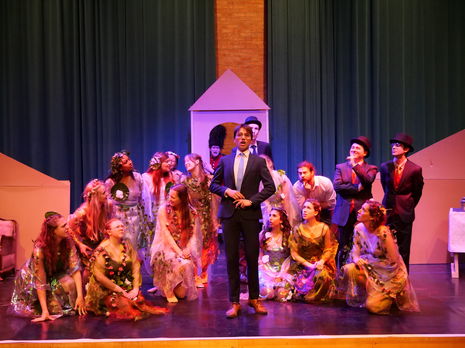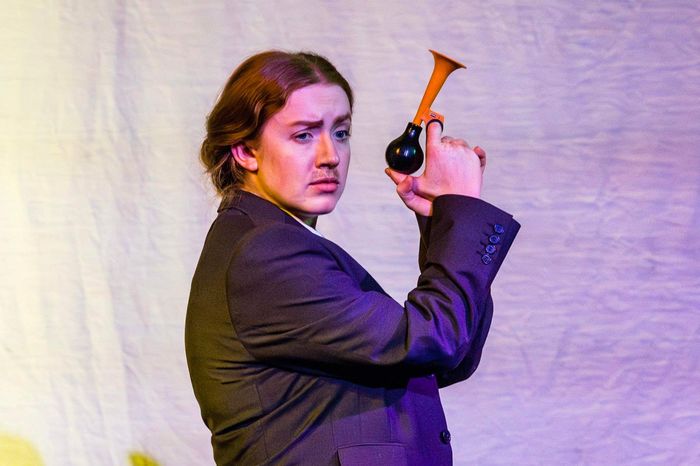Iolanthe is magical and musically rich
This Gilbert and Sullivan classic is full of enchanting visuals and standout performances

Iolanthe, directed by Sebastian Blount and assistant directed by Eliza Ousey, is a vibrant show with a strong cast and a tangible sense of fun. The play follows the story of Iolanthe (a fairy cast out from fairy society for the crime of marrying a mortal), her son Strephon and his affairs in human parliament, and his fiance, pursued by various members of parliament, including her guardian.
Upon entering the theatre, you’re immersed into the mystical pre-show ambience with blue and orange lighting spiralling over the wooden set, and the words ‘Iolanthe, come to our call Iolanthe’ boldly projected above the stage. The show begins with a long orchestral piece before anyone enters the stage. The music is whimsical, evocative, exceedingly well-played and a gentle way to ease the audience into the coming performance - but perhaps slightly drawn out, diffusing some of the suspense built in the first few minutes of the piece.
“Their elegant aspect, cast by draping dresses of iridescent chiffon, perfectly supplements the well-executed ensemble number to follow”
When the actors enter the stage, the audience is stunned by a visual spectacle, notably due to the beautiful costumes of the Chorus of Fairies, designed by Ina Krüger. Their elegant aspect, cast by draping dresses of iridescent chiffon, perfectly supplements the well-executed ensemble number to follow. With intense jumping and vigorous dance moves, there is no audible impact on the vocal delivery, creating a beautiful and energetic first number, led confidently by fairies Celia (Sophia Orr) and Leila (Maria Khokhar).
In general, the ensemble pieces maintain this enthusiasm and quality throughout the show, both visually and aurally. The Chorus of Peers, led by Tolloller (Tom Unwin) and Mountararat (Harry Elliot), are engaging, funny and vocally very strong - especially considering how they are massively outnumbered by the Chorus of Fairies. Though generally well-choreographed, sometimes the movement from the Chorus of Peers feels slightly under-rehearsed and stilted. But, unpolished moments like these by no means overshadow the talent and clear dedication of both the Chorus of Fairies and the Chorus of Peers, which help to make the show bright, entertaining and comedic.
Iolanthe (Holly-Jewitt Maurice) is a vision veiled in gossamer upon her entrance. Maurice’s voice is smooth and effortlessly beautiful and, though sometimes less audible on lower notes, never loses its steady and accurate execution. The Fairy Queen (Kestrel Zakharov) supplies a welcomed comedic relief in the fairy scenes, prompting outbursts of laughter from the audience throughout the play. Zakhavrov’s voice is strong but often nasalised, which detracts from an otherwise accurate vocal performance. The Chancellor is a hilarious and lighthearted satire of contemporary politicians, as are the Chorus of Peers, and is brought to life brilliantly by George Bird. Bird is enigmatic and hilariously pompous. Though some phrases felt slightly rushed, his strong voice captured unwavering audience attention during solos. Private Willis (Peter Coleman) is excellently cast, his posture and comedic timing perfectly executed, with a strong voice that handles songs with a challenging range effortlessly.
“They are equal parts comic relief and incredible singer”
The two main roles, Phyllis (Ina Krüger) and Strephon (Luke Muschialli), are exceptional. Muschialli has incredible vocal stamina and consistently high energy onstage to match. They are equal parts comic relief and incredible singer, delivering a constant confident and entertaining performance from beginning to end. Krüger’s voice is simply breathtaking. It is, without a doubt, a stunning highlight of the whole production. She performs flawless vocal runs with a transportive, nostalgic tone that is truly enthralling to experience.
Iolanthe is bright and full of energy. It can be unpolished in places, but the show’s overall impact is one of joy that is truly reflective of a Gilbert and Sullivan production. Those with a special interest in Music Hall or early 20th-century Musical Theatre would certainly enjoy this show.
 News / Caius mourns its tree-mendous loss23 December 2025
News / Caius mourns its tree-mendous loss23 December 2025 News / Clare Hall spent over £500k opposing busway 24 December 2025
News / Clare Hall spent over £500k opposing busway 24 December 2025 Comment / Yes, I’m brown – but I have more important things to say22 December 2025
Comment / Yes, I’m brown – but I have more important things to say22 December 2025 Comment / The ‘class’ of Cambridge24 December 2025
Comment / The ‘class’ of Cambridge24 December 2025 Interviews / Politics, your own way: Tilly Middlehurst on speaking out21 December 2025
Interviews / Politics, your own way: Tilly Middlehurst on speaking out21 December 2025








